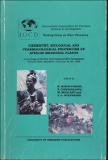| dc.contributor.author | Van Puyvelde, L. | |
| dc.coverage.spatial | Africa. | en |
| dc.coverage.spatial | Rwanda | en |
| dc.date.accessioned | 2016-03-22T11:35:41Z | |
| dc.date.available | 2016-03-22T11:35:41Z | |
| dc.date.issued | 1996-02 | |
| dc.identifier.citation | Van Puyvelde, L. (1996) Research, development and production of plant- based medicines in Africa. Example of Rwanda. In: Hostettmann, K., Chinyanganya, F., Maillard, M. and Wolfender, J.-L. (eds.) Chemistry, biological and pharmacological properties of African medicinal plants: proceedings of the first International IOCD-Symposium, Victoria Falls, Zimbabwe, February 25-28 1996. Harare: UZ Publications, pp. 221- 234. | en |
| dc.identifier.isbn | 0908307594 | |
| dc.identifier.uri | https://opendocs.ids.ac.uk/opendocs/handle/20.500.12413/10223 | |
| dc.description | A seminar paper on research, development and production of medicines from African herbs of Rwanda. | en |
| dc.description.abstract | Rwanda is one of the smallest and poorest countries in Central Africa. It possesses a wealth of traditional medicine that is still very much alive.
This traditional medicine can be viewed as a rich resource and as having real potential in resolving the country's various health problems. But, sadly, in the countries where this form of medicine flourishes, it cannot find the socio-technical support needed to exploit it and get the most out of it. The World Health Organization has recognized the part that this medicine must play in its health program for the year 2000.
In Rwanda, as in other developing countries, around 80% of the population has recourse to this medicine which is packed with a great mass of knowledge that is still secret and that needs to be saved quickly if it is not to disappear altogether. This is made all the more urgent by the fact that the arsenal of so-called modem medicines can no longer cope with the many different health problems and that these medicines are less and less available. It is very fortunate that peoples or groups of people who have no other recourse to medicine than the traditional variety have not abandoned it. It makes it possible to come upon new combined resources that guarantee endogenous development while opening up new capacities for further progress and co-development.
If. for peoples of the least developed countries like Rwanda, medicinal plants and traditional medicine retain such an important place, not only for their own benefit but also for that of the whole human race, are there not grounds for preserving this heritage or, better still, exploiting and developing it as a response to bad development in the South and in the North? Indeed is there not the obligation to do so? That at least was the idea that motivated certain researchers at the National University of Rwanda (N.U.R.) in their efforts to (re)direct their research activities and give them greater social usefulness with sustainable development as the goal. | en |
| dc.description.sponsorship | International Organization for Chemical Sciences in Development (IOCSD) | en |
| dc.language.iso | en | en |
| dc.publisher | University of Zimbabwe (UZ) Publications | en |
| dc.rights.uri | http://creativecommons.org/licenses/by-nc-nd/3.0/ | en |
| dc.subject | Health | en |
| dc.subject | Science and Society | en |
| dc.title | Research, development and production of plant- based medicines in Africa. Example of Rwanda | en |
| dc.type | Book chapter | en |
| dc.rights.holder | University of Zimbabwe (UZ) | en |


